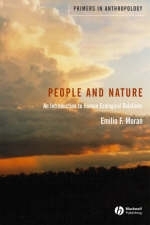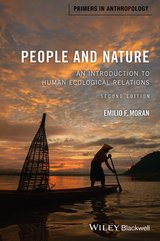
People and Nature
Blackwell Publishing Ltd (Verlag)
978-1-4051-0572-9 (ISBN)
- Titel erscheint in neuer Auflage
- Artikel merken
This book provides a lively and thoughtful introduction to ecological anthropology by examining the evolving relations between human communities and nature. Written by a noted anthropologist, geographer, and environmental scientist, this work: reviews the evolution of human interactions with the natural world - drawing from anthropology and geography; explores those aspects of human ecological relations that seem to account for the greater connectedness of certain societies to their physical environment; and, offers a vision for improved relations between humans and nature.
Emilio F. Moran is Rudy Professor of Anthropology at Indiana University and also Professor of Environmental Sciences, Adjunct Professor of Geography, and Director of the Anthropological Center for Training and Research on Global Environmental Change.
Preface. List of Figures. 1. Human Agency and the State of the Earth. Introduction. Can one conceive of ecosystems without human agents?. Human agency: individuals making a difference. Overwhelming evidence for concern with the condition of the earth system. Looking back and looking forward. 2. A Reminder: How Things Were. The study of human ecological relations. The contemporary study of environmental issues. The evolution of human-environment interactions. Hunter-gatherers: Setting our preferences. How did we decide to become farmers?. Herding and farming: An uneasy relationship. More food for the masses. 3. The Great Forgetting. Earth Transformations in prehistory. The archeology of environmental change. The urban-industrial revolution and the unleashing of Prometheus. The contemporary situation: Human-dominated ecosystems. 4. The Web of Life: Are We in It?. The web of life and trophic relations: Thinking ecologically. Ecosystem productivity and net primary production. Land Use and long-term disturbance. 5. What Makes People Want to Change the Environment?. Learning, Adaptation, and Information. Mitigation and the Cautionary Principle. Transforming the face of the earth through making better decisions. Population and the Environment. 6. Rebuilding Communities and Institutions. Community in human evolution. What is sacred in human evolution?. Tragedies of the commons. Institutions and self-organization. Bioregionalism, deep ecology and embedding people in nature. 7. Can We Learn When We Have Enough?. Material boys and material girls. Patterns of consumption in developed countries. Patterns of consumption in developing countries. A feeding frenzy and a crisis in public health. Burning fossils fuels instead of calories. Do we have enough material goods now?. 8. Quality of Life: When Less Is More. Resource abundance vs resource scarcity. When less is more. The scale of the problem and the scale of the solutions. Restoring Our Balance: Valuing community, and trust, rather than more "stuff". Are we happier when we have more?. References. Index
| Erscheint lt. Verlag | 22.12.2005 |
|---|---|
| Reihe/Serie | Primers in Anthropology |
| Zusatzinfo | 53 |
| Verlagsort | Oxford |
| Sprache | englisch |
| Maße | 156 x 231 mm |
| Gewicht | 340 g |
| Themenwelt | Naturwissenschaften ► Biologie ► Ökologie / Naturschutz |
| ISBN-10 | 1-4051-0572-0 / 1405105720 |
| ISBN-13 | 978-1-4051-0572-9 / 9781405105729 |
| Zustand | Neuware |
| Haben Sie eine Frage zum Produkt? |
aus dem Bereich



